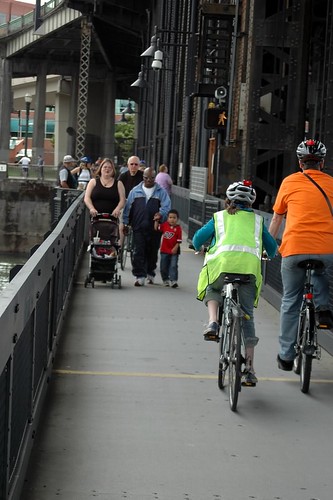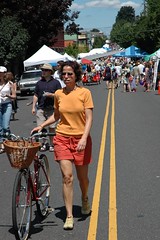“What about ambulances?” a friend who is visiting from New York asked recently as I was excitedly telling her about our bike community and recent car-free activism. I had no idea what she was referring to.
“And what about handicapped people?” she added by way of explanation. I was still confused. “Well, if you ban cars, not everybody can ride bicycles all the time!” she finally said.
Aha!
This is a pretty common narrative, actually, in some form or other, part of the cultural divide between the Portland bubble and what sometimes seems like the rest of the world.
Any reference to bicycle activism seems to conjure up images of Critical Mass and pierced messengers, and ideas of militant, my way or the highway (so-to-speak) activism that is far too common. As if to intentionally choose bike riding is to automatically reject all other options.
I have developed a few stock responses.
There’s the super-diplomatic version, like for my boyfriend’s republican parents: We want people to have choices, and we want the most attractive choices to be something other than private cars.
Or there’s the shock-and-awe response (kudos to my friend Anna): Actually, I don’t really care about bikes. I love to ride, and bikes are currently necessary as an alternative way to get around cities designed for cars. But the most revolutionary thing is to redesign neighborhoods so that you can walk—or take transit—everywhere you need to go. Walking isn’t an alternative to anything,it’s a means and an end in itself.

It’s kind of distressing to encounter these assumptions. The thing that really disturbs me, though, is how easy it is for bike activists to slip into making this exact sort of dictatorial demands that people expect from us. We need to step back and see that it’s about more than just the bikes.
It’s not even just about transportation, but about public space, health, safety, thriving communities, social equality, and…well you get the idea.
Bicycling is one mode, and a powerful one. But it’s just one of several, and it’s not even necessarily the ideal. We need to reach out to people who rely on the bus, who rely on their feet, who maybe can’t even afford a bike much less a car, and turn some of the amazing energy of Portland’s bicycling community into a broader vision of a city where everyone can get where they’re going.


